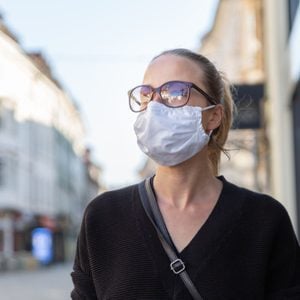A Covid-19 Winter Is Coming: Use These Expert Tips to Prep
Updated: Mar. 14, 2022
From stocking your pantry to creating a cozy nest, here are expert tips on preparing for a coronavirus winter.
Winter is coming—and Covid-19 cases are climbing
Let’s face it: This winter is going to be different. Not only are many places still dealing with the effects of wildfires, hurricanes, and political unrest, but the Covid-19 pandemic is still raging. Experts say the worst days of it may yet be ahead. Unlike the early days of the pandemic, when we had everything to learn about the deadly virus, we almost feel like we know too much—and it often feels exhausting, says Kristen Carpenter, PhD, chief psychologist in the department of psychiatry and behavioral health at The Ohio State University Wexner Medical Center.
The coronavirus shows no sign of stopping, vaccines are still months away, lockdowns are cropping up again, and people are starting to feel more trapped and fearful than ever, she says.
Why pandemic pressure isn’t letting up
The pandemic is stressful for everyone, but the effects of the stress varies from person to person, says Joshua Felver, PhD, professor of psychology at Syracuse University and director of the Mind Body Laboratory at the university. “There is a difference between a stressor, an external event, and the unique way each person experiences that stress,” he says. “For instance, the upcoming winter and predicted increase in coronavirus infections is a stressor that everyone will face in the months ahead but people’s experience will vary based on the resources they have, like healthcare access, the ability to work remotely, and caregiving responsibilities.”
Another factor: The pandemic has changed from being an “acute” stressor to a “chronic” one. This changes the way we deal with it. “An acute stressor—like dealing with a crisis in the moment—is related to an increase in immune system functioning,” says Felver. “Chronic stressors—like surviving during a global pandemic—actually wear down the immune system and decrease its overall performance. It’s important during the upcoming ‘stressor-ful’ months to engage in activities to reduce stress.”
The best thing you can do right now is to understand that there are things you can do to help yourself. “Getting prepared now can help reduce your stress and prevent anxiety and fear of the future,” Carpenter says. “The future, by definition, is uncertain. So instead of trying to control it, come up with strategies now to deal with that uncertainty.”

What you can do to prep for a coronavirus winter
Start with the basics
The first thing you should do to prepare for the winter ahead? Make sure you have an extra supply of food, water, medicine, and hygiene and cleaning supplies, according to the Federal Emergency Management Agency (FEMA). The early days of the pandemic showed us how quickly things can disappear from store shelves (toilet paper, ahem). Make sure you avoid getting caught short by picking up a few extra items each time you go to the store. No need to hoard, just keep enough handy to get you through a few weeks if you’re unable to leave your home due to personal illness or Covid-19 restrictions. (Here’s a list of what you should buy for a pandemic.)
Make an emergency plan
Whether it’s the pandemic, a natural disaster, or civil unrest, chances are good that you’ll be affected by some type of tough situation this winter. Making a plan of what to do in each situation will go a long way in helping you feel prepared and calm, says Dan Kessler, preparedness expert and CEO of Harbor, a free app that helps people develop a personalized emergency plan. You can write out your own or use the Harbor disaster preparedness app. But, the important part is to think through what you’ll need and what you’ll do so you’ll be ready if a crisis happens.
Get your grandparents a tablet
Since the elderly are at the highest risk for complications from Covid-19, it’s especially important for them to be diligent about social distancing. Unfortunately, this can lead to feelings of isolation, loneliness, and a decline in mental and physical health, says Scott Kaiser, MD, a family medicine physician and director of Geriatric Cognitive Health at the Brain Health Center at the Pacific Neuroscience Institute in Santa Monica, California.
To help your older loved ones stay connected, get them a tablet. Set it up with video chatting, pictures of relatives, brain games, and important contacts pre-programmed in. That way, all they need to do is push a button to connect. “Maintaining relationships and meaningful social connections is one of the best things you can do to help them, and you, stay safe and healthy in mind and body,” he says. Here’s what you need to know about seeing your grandparents during coronavirus.
Stock up on hand soap and sanitizer
Regular hand washing is key to staying healthy. But as we saw this spring, soap and hand sanitizer flew off the shelves and became difficult to find, Dr. Kaiser says. Now that shelves are restocked, he recommends taking advantage of the supply. Buy extra bottles to keep on hand and save you from frantic searches or price gouging.
Buy blackout curtains
“As we age, our immunity naturally tends to decline and we become more susceptible to infections,” Dr. Kaiser says. “One of the best things you can do to strengthen your immune system is to get a good night’s sleep every night.” Blackout curtains have the dual effect of keeping light from street lamps or flashing holiday decorations out and keeping heat in, both of which can help you get the sleep your body needs to stay healthy.
Start a journal
Writing is a powerful way to process your thoughts and feelings during tumultuous times, says Mayra Mendez, PhD, a licensed psychotherapist and program coordinator of mental health services at Providence Saint John’s Child and Family Development Center in Santa Monica, California. Find ways to make it fun (sticky notes, colored pens, and washi tape aren’t just for teen diaries).
“Writing can be done simply and quickly as thoughts come to mind,” she says. “The idea is to relax with your thoughts and experiences and allow yourself to process the positive as well as the negatives of the day.” Here’s how to start a journal.
Make a self-care box
How do you feel pampered and cared for? For some people it’s a bar of chocolate. For others, it may be a bubble bath, a new book, a puzzle, or a pair of cozy socks. Take time now to gather things that you love and put them in a self-care box that you can pull out on particularly dark or tough winter days, Mendez says.
“Self-care is an important aspect of coping with day-to-day stress, as well as the stress induced by life crises and uncertainties,” she says. “Self-care activities promote a sense of control and replenish energy, creativity, stamina, and cognitive processing.” It can also help you feel hopeful, reminding you of the good things in your life, she adds.
Fortify your immune system
Chronic stress lowers your immune system, exactly what you don’t need during a pandemic. So it’s critical to start doing everything you can now to build and fortify your immune system, Felver says. “Regular exercise, high-quality and sufficient sleep, and a healthy diet form the bedrock for health and your immune response,” he says. Don’t get caught in the all-or-nothing trap (“If I eat a donut for breakfast I might as well give up for the rest of the day”). Every little thing you can do to improve your physical health, helps your immune system, he adds.
Set up a cozy “movie theater”
Binge-watching your favorite shows can be a good way to unwind when you can’t go outside or get together. But all of that sitting—especially if you’re slumped over your laptop—can be bad for your body, causing backaches, neck problems, and eye strain, says Neel Anand, MD, professor of orthopedic surgery and director of spine trauma at Cedars-Sinai Spine Center in Los Angeles.
Set up a place where you can watch comfortably, perhaps using an ergonomic chair or getting an adjustable TV stand. “You should be able to comfortably look at the device without bending your body and be able to view the screen at eye level,” he says. “And be sure to take breaks at least once an hour to get up and move and stretch.”
Buy waterproof walking shoes
Resist the siren call of the couch this winter and make sure you’re getting some daily movement—it’s essential for your mental and physical health, says S. Adam Ramin, MD, surgeon and medical director of Urology Cancer Specialists in Los Angeles. “This may seem difficult right now, given our current circumstances,” he says. “However, you don’t have to run marathons to move the physical fitness needle from sedentary to non-sedentary.
“Just setting an alarm on your phone that alerts you every half hour to get up and move around is enough to help,” adds Dr. Ramin. “But if you can, get outside and go for a walk while maintaining a safe physical distance from others.” Getting waterproof boots or traction devices like Yaktrax for regular shoes can make it easier to walk in snow and ice.
Download a fitness app
If getting out to exercise won’t work, consider checking out some fitness apps or YouTube exercise videos. You may also want to invest in some basic gym equipment, like hand weights or a portable stair-stepper. “You might be surprised at how much you can move your body in a seemingly small space,” Dr. Ramin says.
Make a meditation nest
Meditation and mindfulness aren’t just buzzwords; they’re powerful tools to help your brain adapt to and manage stress, says Vernon Williams, MD, founding director of the Center for Sports Neurology and Pain Medicine at Cedars-Sinai Kerlan-Jobe Institute in Los Angeles, and a consulting neurologist for the Rams.
“This is not just some passive breathing exercise,” he says. “It’s a significant brain training resource. Achieving control of your thoughts so that your thoughts don’t control you can be a super-power for many people.” You can download an app, follow a guided meditation on YouTube, or just count your breaths. The key is to do it every day, he says. To make sure you stick to the habit, create a soothing space where you will want to go each day. Even just a soft cushion with a scented candle can feel special.
Find and bookmark local, city, and state information websites
Having accurate, up-to-date information is vital to staying safe and sane this winter yet misinformation is everywhere, says Iahn Gonsenhauser, MD, a doctor of internal medicine and chief quality and patient safety officer at The Ohio State University Wexner Medical Center. Everything from whether you can travel during Covid-19, how strict you need to be about social distancing, where masks are required, quarantine regulations, and other pandemic guidelines and restrictions vary from place to place and week to week.
Social media is a common place to find this info, but it’s not always a reliable source. Make sure you find the official sources of information and updates for your area (including official social media accounts). Bookmark them so you can find them quickly when needed. While you’re at it, do the same for weather and air quality sites.
Connect with a therapist
Don’t wait until you’re having a mental health crisis to seek out professional help from a therapist, says Carpenter. “Thanks to teletherapy, it’s easier than ever to find and connect with a therapist,” she says. “If you wait until you’re overwhelmed it may feel too difficult. Why not establish a relationship with a therapist now? If you don’t need them, it’s no problem, but if you do, you’ll already have that resource.” Here are tips for finding a therapist.
Post a love-it list
When you’re in the middle of a funk, it can be hard to remember anything good so make a list now of things that make you happy, Carpenter says. “Actually write down things that help you,” she says. “This will help reinforce it in your brain.”
Your love-it list could include pictures of loved ones, ideas of fun activities, favorite movies and books, games, karaoke songs, dream vacations—anything that can help distract you from getting sucked into a vortex of negative thoughts. Then post the list where you can see it and add to it regularly. Also, try a gratitude journal.
Set up your medications for delivery
If you have a chronic illness, like heart disease or diabetes, it’s extremely important to talk to your doctor about how to manage it through the upcoming pandemic and winter, says Randy Stein, MD, endocrinologist at Westmed Medical Group in White Plains, New York. “This will help protect you in several ways,” she says. “For example, type 2 diabetes increases your risk of complications from Covid-19.” One thing you can do now: Ensure a regular supply of any medications you need by setting up a pharmacy delivery service.
Prepare your will and medical directives
No one likes to think about their end-of-life decisions—especially during a pandemic. However, preparing and collecting important documents—including a will, medical directives, and financial information—can save your loved ones a lot of stress down the line, according to FEMA. You can relax knowing everything is in order.
Make a peaceful playlist
“Music, exercise, dance, and singing are activities that enhance mental health by reducing anxiety and maximizing positive mind states,” says Steve Joordens, professor of psychology at the University of Toronto. As the lead guitarist and lead singer for his hobby band, he says it’s helped lower his stress and increase his creativity.
You don’t have to start a band to see the benefits of music in your life. Sing along with your favorite soundtrack, have an impromptu dance party in your living room, play a dancing video game, practice an instrument, or make a playlist of your favorite happy or calming songs to play on bad days.




